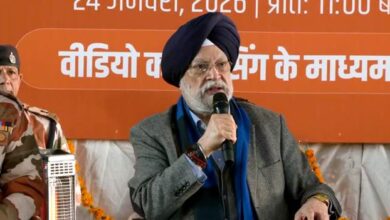Trade Unions will continue to oppose the Pro-Corporate Labour Codes – C Srikumar, National Secretary of AITUC
Why should the working class surrender their rights for the cause of Corporate houses, asks the veteran trade union leader

PICTURE COURTESY : Employment and Labour Laws – UK
OPINION PIECE
Modi 3.0 Government is going ahead with the implementation of the controversial 4 Labour Codes which has replaced the existing Labour Laws. From today’s media report it is seen that the Union Labour Minister Mansukh Mandaviya has convened a meeting of the Central Trade Union on 25th and 26th of July to discuss about the implementation of 4 Labour Codes. It is also learnt from media reports that the RSS affiliated BMS have demanded implementation of wage code and social security code and demanded for certain amendments in the Industrial Relation Code and Occupational, Safety, Health & Working Conditions Code.
C. Srikumar National Secretary of AITUC and also the Deputy General Secretary of WFTU, told www.indianpsu.com the position of the other Central Trade Unions in the meeting with the Union Labour Minister and also their future course of action.
He said that the 10 Central Trade Unions including AITUC, HMS, CITU and others from the beginning have taken a clear position to oppose the tinkering of Labour Laws and converting and amalgamating the Labour Laws in to 4 Labour Codes. The Central Trade Unions on the 26.10.2023, in a letter addressed to the Director General of ILO have categorically stated the following – “Indeed, the right to strike is of the utmost importance for workers in India and the inability of the ILO to supervise this right, as a consequence of the dispute, in our national context is potentially seriously affecting labour relations in our country”.
“In India, the right to protest is a fundamental right under Article 19 of the Constitution of India. And the right to strike is a lawful right under the provisions of the Industrial Disputes Act, 1947″.
Srikumar is of the view that the Industrial Relations Code, forcibly enacted by the GOI in blatant violation of all basic principles of Tripartism and also in violation of basic legislative procedures and norms, prohibits the right to strike and demands that unions give a 60-day notice to strike. When a notice leads to automatic conciliation and striking during conciliation is illegal. Workers cannot strike when conciliation proceedings are pending before a conciliation officer and seven days after they are completed or Legal proceedings are pending before an Industrial Tribunal/National Industrial Tribunal or arbitrator and sixty days after they are completed. The Code thus destroys the freedom of association guaranteed to Indian citizens under the Constitution.
He said “on the whole, the Labour Codes seek to destroy all the basic rights of the workers. All the Central Trade Unions submitted complaints to the ILO against the Labour Codes, trampling underfoot all the labour rights and violation of ILO Core Conventions, which has been duly acknowledged by the ILO. Trade Unions have claimed and seriously oppose that these Labour Codes are anti worker as they paved the way for a “hire and fire” policy and Trade unions unanimously demanded scrapping of the Labour Codes and organised couple of massive national General Strikes on that demand and have also been resisting implementation of various provisions of Labour Codes through united struggles in many industrial sectors across the country. The new norms would adversely affect the workers by allowing easy retrenchment and exempting certain categories of companies from adherence to the laws that safeguard their rights and imposing conditions of virtual slavery on the working people. The Joint platform of CTUs firmly reiterates that the right to strike is an inalienable and fundamental right at work”.
The Trade Unions of India never demanded for any Labour Codes, it was only the demand of the employers and the corporate houses. The existing Labour Laws itself are not properly implemented by the Government and the enforcement authorities both in the Central and State Government are completely toothless. If the Labour Codes are implemented then majority of the workforce will be out of coverage of the Labour Laws and the Small Scale Industries will be completely the out of purview of the Labour Codes. The Laboratories under the DRDO are today “Industry” and the employees are governed under Industrial Dispute Act 1947. The New Labour Code have excluded the DRDO, ISRO and Department of Atomic Energy from the definition of “Industry” there by taking away their existing rights to organized Trade Unions and also their right to strike. Moreover, Apprentices are excluded from the ambit of Labour Laws. Minimum Wages in India are the lowest in the World when compare to other Countries. The revisions of minimum wages have been left to the committees being constitute for the same. The Labour Inspectors who are responsible for enforcement of the Labour Laws have been replaced with “Inspector-Cum-Facilitator” without any power. Today under the Payment of Wages Act 1936, Minimum Wages Act 1948 and the Equal remuneration Act 1976 provide for fine and / or imprisonment as penalty. However, under the proposed code bill the penalty of imprisonment is done away with, at least in the first instance of violation. Employers are empowered to extract work from the workers beyond the fixed working hours. The employers are always demanding that they want that the Labour Laws should be flexible on the plea of “ease of doing business”. The 44 existing Labour Laws were achieved by the India working class after a century law agitations and scarifies. Why should the working class and their Trade Unions surrender these rights for the cause of the Corporate houses for minting their profits. Therefore the Trade Unions will continue to oppose and fight against the anti-worker Labour Codes, concluded C. Srikumar.
Views expressed here are those of C Srikumar, veteran trade union leader and who is also the National Secretary of AITUC




